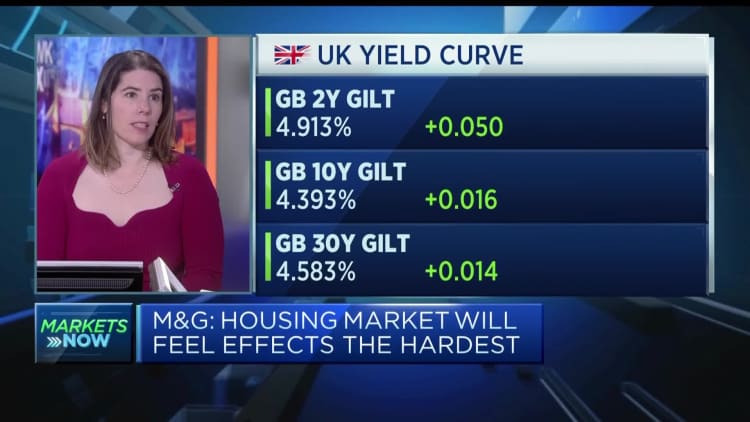LONDON — U.K. gross domestic product fell by 0.5% in July, below the 0.2% contraction forecast in a Reuters poll of economists.
Services output was the main drag, the Office for National Statistics said, declining 0.5%. The economy put in a better-than-expected performance for the second quarter as a whole, with the ONS reiterating its reading of 0.2% growth. July's surprise dip meant the economy shrank at its fastest pace since December, according to ONS figures.
It is the latest sign of economic strain in the higher interest rate environment. On Tuesday, figures showed U.K. mortgages in arrears jumped to a seven-year high in the three months to June.
Major investment banks trimmed their U.K. growth expectations following the reading. Goldman Sachs revised its annual growth forecast to 0.3% from 0.5%, while JP Morgan downgraded its 2023 forecast to 0.4% from 0.6%, and its 2024 forecast to 0.2% from 0.4%.
James Smith, developed markets economist at ING, said in a note that "cutting through the noise, the economy seems to be still growing, albeit fractionally."
"We think the economy is likely to more or less flatline over coming quarters – and a mild recession can't be ruled out," he said.
Paul Dales, chief U.K. economist at Capital Economics, said the GDP figures may indicate a mild recession has already begun and "underlying growth has lost momentum since earlier in the year."
Dales highlighted strikes and unusually wet weather as weighing on certain sectors, but said output declined more broadly, suggesting widespread weakness.
"Even so, with wage growth still uncomfortably strong, we suspect the Bank of England will still raise interest rates one final time next week, from 5.25% to 5.50%," Dales said.
A potential concern for the central bank came Tuesday, when data showed annual growth in pay excluding bonuses remained steady at 7.8%, the highest on record. This was combined with a sign of slight cooling in the labor market, as unemployment rose 0.5 percentage points.
The British pound was 0.2% lower against the U.S. dollar at $1.245 at 8:40 a.m. London time Wednesday, as it also declined against the euro.

Jane Foley, head of FX strategy at Rabobank, said the BOE faced a "difficult predicament" given strong earnings data and slower U.K. growth.
"While the market is assuming that a September rate hike is a done deal, the uncertainty for following meetings is rising. Clearly too much tightening would risk a U.K. recession and this possibility appears a little stronger after today's monthly GDP report," she said via email.
"Weaker growth data thus increases the chances that Bank rate will reach its peak this month – an outlook which is weighing on the pound this morning."


